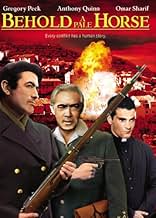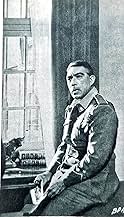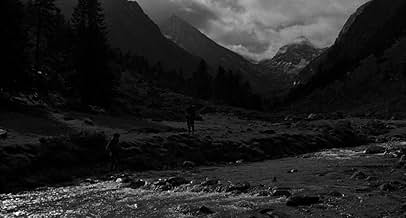IMDb RATING
6.7/10
2.4K
YOUR RATING
Famous Spanish bandit Artiguez returns to his native Spanish village after 20 years in French exile, but Spanish cop Vinolas sets a trap for him.Famous Spanish bandit Artiguez returns to his native Spanish village after 20 years in French exile, but Spanish cop Vinolas sets a trap for him.Famous Spanish bandit Artiguez returns to his native Spanish village after 20 years in French exile, but Spanish cop Vinolas sets a trap for him.
Marietto
- Paco Dages
- (as Marietto Angeletti)
Perrette Pradier
- Maria, Hussy
- (as Perette Pradier)
- Director
- Writers
- All cast & crew
- Production, box office & more at IMDbPro
Featured reviews
In 1939 like John Wayne's Ethan Edwards in The Searchers, Gregory Peck does not believe in surrenders. When all the others give up their weapons and go home, Peck conspicuously keeps his and keeps up the good fight. Of course twenty years later, Peck's become nothing more than a common bandit with the barest trappings of the revolutionary ardor he once had for the Republican cause in the Spanish Civil War.
His rival, his Pat Garrett to Peck being Billy the Kid, is the local captain of the Guardia Civil in Anthony Quinn. Peck's constant raids into his border area from France are a source of embarrassment to him and block his chances for advancement. At one time Quinn was a hardened Falangist, but now he's just a policeman.
Twenty years as made a lot of changes in both men. Quinn a devote Catholic who probably joined the fascist forces because of the anti-clerical attitudes of the Republican government now observes the form of religion, but he's got a mistress on the side. When he goes to pray it's not for anything profound, just please let him get Peck so he can advance.
Peck is as anti-clerical as he was during the Spanish Civil War in the late Thirties, but now is really into it a lot for violence's sake. He also knows his cause is long lost, but needs the excuse for what he's now doing. He also gets quite a surprise in finding a priest like Omar Sharif going to warn him about an informer in his crew. Catholics do come in all shapes and sizes.
Although Peck is somewhat miscast as a Spaniard, still he does a good job as does Quinn and Sharif. The strength of Behold a Pale Horse is that it presents both Peck and Quinn as flesh and blood people, neither of them all good or all evil from your point of view.
Behold a Pale Horse was made in 1964 and eleven years later Francisco Franco in whose service Quinn was in died after being dictator of Spain for 36 years. When I visited Spain in 2001 the thing that struck me was how there was very little evidence of Franco's reign. Spain has now settled quite nicely into a constitutional monarchy with a functioning parliament. And the Catholic church which rode as high in Spain as it did during Philip II is rapidly losing influence.
Kind of makes you wonder just what Peck and Quinn were fighting about.
His rival, his Pat Garrett to Peck being Billy the Kid, is the local captain of the Guardia Civil in Anthony Quinn. Peck's constant raids into his border area from France are a source of embarrassment to him and block his chances for advancement. At one time Quinn was a hardened Falangist, but now he's just a policeman.
Twenty years as made a lot of changes in both men. Quinn a devote Catholic who probably joined the fascist forces because of the anti-clerical attitudes of the Republican government now observes the form of religion, but he's got a mistress on the side. When he goes to pray it's not for anything profound, just please let him get Peck so he can advance.
Peck is as anti-clerical as he was during the Spanish Civil War in the late Thirties, but now is really into it a lot for violence's sake. He also knows his cause is long lost, but needs the excuse for what he's now doing. He also gets quite a surprise in finding a priest like Omar Sharif going to warn him about an informer in his crew. Catholics do come in all shapes and sizes.
Although Peck is somewhat miscast as a Spaniard, still he does a good job as does Quinn and Sharif. The strength of Behold a Pale Horse is that it presents both Peck and Quinn as flesh and blood people, neither of them all good or all evil from your point of view.
Behold a Pale Horse was made in 1964 and eleven years later Francisco Franco in whose service Quinn was in died after being dictator of Spain for 36 years. When I visited Spain in 2001 the thing that struck me was how there was very little evidence of Franco's reign. Spain has now settled quite nicely into a constitutional monarchy with a functioning parliament. And the Catholic church which rode as high in Spain as it did during Philip II is rapidly losing influence.
Kind of makes you wonder just what Peck and Quinn were fighting about.
When the Spanish War was finished, winners devoted to go after anybody who reflected the red light of the communism or any other color they dislike. On the other hand, few guerilla fighter continued his actions against the winners. But their strength was lower every time. One of this guerrilla was Valentin González "el campesino", which figure is portrayed in this film in a free form (not in an historical form).
Twenty years after the Civil war conclusion, the Spanish police has a good option to capture one of these ex-combatants, who was in exile in France. The description of the methods and day-to-day life of the Spanish police could be the reason which explains that the Spanish Government forbade any more Columbia's film in Spain.
You need no knowledge about the twenty Century Spain's history to understand the film, although you can enjoy more it if you know something. In fact, the film put in a specific political situation the psychological confrontation between two men. It could be a good exercise to understand the motives which impulse his actions.
Twenty years after the Civil war conclusion, the Spanish police has a good option to capture one of these ex-combatants, who was in exile in France. The description of the methods and day-to-day life of the Spanish police could be the reason which explains that the Spanish Government forbade any more Columbia's film in Spain.
You need no knowledge about the twenty Century Spain's history to understand the film, although you can enjoy more it if you know something. In fact, the film put in a specific political situation the psychological confrontation between two men. It could be a good exercise to understand the motives which impulse his actions.
This excellent film tells the story of a stubborn Spanish republican, Manuel Artiguez, who refused to give up the fight when his side lost the Spanish civil war to the fascists in 1938. The film takes place twenty years later, when after many successful raids, Artiguez has lost the will to continue. However, his adversary, a Spanish police chief called Vinolas, has not yet given up on capturing or killing him and sets a trap for him. The trap and the question of whether Artiguez will fall into it it will keep you on your seat for most of the movie. Three men caught between Artiguez and Vinolas, an informer, a priest, and an idealistic Spanish exile boy, add a rich psychological and moral dimension to the film, following themes of idealism, revenge, and the uses of violence.
"Behold" is a great thriller with highly complex characters and a profound moral sensibility. The idealism of Spanish republicans like the boy is on the one hand supported by the oily and hypocritical Vinolas, and on the other hand undercut by the rawness and violence of Artiguez. Neither of the adversaries is vindicated, but neither are they equivalent to one another. The ending will set you thinking for hours, if you're so inclined.
Performances by Peck (Artiguez) and Quinn (Vinolas) are great. Peck is less stuffy than usual. I'm not generally a fan of earnest, wet-eyed Sharif (the priest), but his performance here suits the movie quite well. I can still hear his voice saying "Did the informer escape? Is the bandit safe?"
My only complaint is that for all of its thematic complexity and richness of character the film is at times somewhat melodramatic and the dialogue is sometimes a little clunky. And for some reason its parts, good characters, good plot, good actors, all excellent, do not quite add up into a perfect whole. Nor is it as good as some of the movies it slightly resembles: Guns of Navarone, Battle of Algiers, Wild Bunch. However, it is definitely worthwhile for fans of 'thoughtful thrillers'.
"Behold" is a great thriller with highly complex characters and a profound moral sensibility. The idealism of Spanish republicans like the boy is on the one hand supported by the oily and hypocritical Vinolas, and on the other hand undercut by the rawness and violence of Artiguez. Neither of the adversaries is vindicated, but neither are they equivalent to one another. The ending will set you thinking for hours, if you're so inclined.
Performances by Peck (Artiguez) and Quinn (Vinolas) are great. Peck is less stuffy than usual. I'm not generally a fan of earnest, wet-eyed Sharif (the priest), but his performance here suits the movie quite well. I can still hear his voice saying "Did the informer escape? Is the bandit safe?"
My only complaint is that for all of its thematic complexity and richness of character the film is at times somewhat melodramatic and the dialogue is sometimes a little clunky. And for some reason its parts, good characters, good plot, good actors, all excellent, do not quite add up into a perfect whole. Nor is it as good as some of the movies it slightly resembles: Guns of Navarone, Battle of Algiers, Wild Bunch. However, it is definitely worthwhile for fans of 'thoughtful thrillers'.
This is a film which has almost faded into total obscurity, and that's tragic, because it's well worth seeing. It's sort of a thinking person's suspense movie, better appreciated if you know some details about the intricate historical background in which it is set. Even so, it can be appreciated for its dramatic settings and characterizations. It has a complicated plot, to be sure, but the story rolls right along...not a lot of action until the end, but the tension builds steadily. I'm no fan of Peck, but his role here really drew me in. He looks beaten down by a hard life and way too much unhealthy passion. Quinn doesn't have much screen time, but I liked some of the minor characters best...their faces were great. The credit sequence, meshed together perfectly with newsreels, shows a long line of defeated soldiers, their faces reflecting defeat and confusion... a great tracking scene.
Here are some reasons I think the film is unknown: 1. The main character is an atheist communist anti-catholic guerilla bandit. Not a popular icon in American movies. 2. Complex historical background. 3. Knowledge of political situation in Spain a minimum requirement. Not a priority on many American's lists. 4. Black and white photography in 1964. (Hey, I liked the scenery...but you always wonder how it would look in color...and this was a late date for a black and white feature film.) 5. Civil War movies (even Spain's) always run a risk...you might alienate half the audience.
Here are some reasons I think the film is unknown: 1. The main character is an atheist communist anti-catholic guerilla bandit. Not a popular icon in American movies. 2. Complex historical background. 3. Knowledge of political situation in Spain a minimum requirement. Not a priority on many American's lists. 4. Black and white photography in 1964. (Hey, I liked the scenery...but you always wonder how it would look in color...and this was a late date for a black and white feature film.) 5. Civil War movies (even Spain's) always run a risk...you might alienate half the audience.
I get surprise when see that only a few people see this film because I think that it is one of the best zinnemann film.The story which is about alone man that is far from of best years of his life and right now is desolate and subsist in very hard condition(spiritual)is so nice.Peck,Quinn and Sharif all are in their best. Scene that vinolas(Quinn)pray in church is unforgettable.
Did you know
- TriviaThe movie was banned in Spain, which was still ruled by Generalisimo Francisco Franco, the fascist victor of the Spanish Civil War.
- GoofsIn the first 5 minutes of the movie it is supposed to be 1939 and the Loyalist (Republican) soldiers are crossing into exile on the French border. As they cross over they are turning in their guns and the first one to turn in his gun turns in a Soviet PPSh-41 sub-machine gun. The PPSh-41 was not developed until 1941.
- Crazy creditsOpening credits - the first card shown contains the passage from Revelations 6:8, which contains the phrase "Behold a Pale Horse", the title of the film.
- ConnectionsFeatured in Hollywood contra Franco (2008)
- How long is Behold a Pale Horse?Powered by Alexa
Details
Box office
- Budget
- $3,900,000 (estimated)
- Runtime2 hours 1 minute
- Color
- Sound mix
- Aspect ratio
- 1.85 : 1
Contribute to this page
Suggest an edit or add missing content

Top Gap
By what name was Et vint le jour de la vengeance (1964) officially released in India in English?
Answer



































